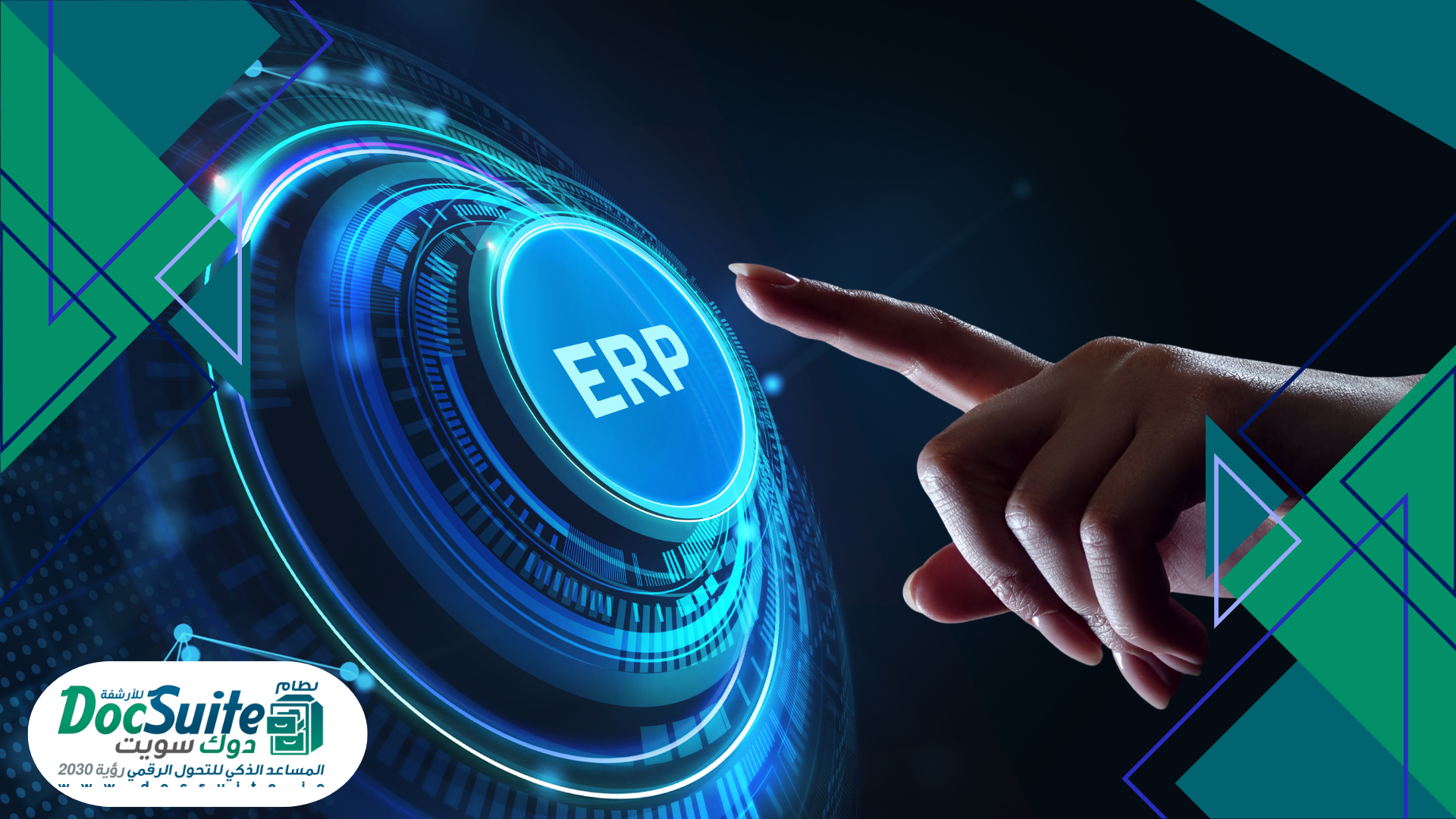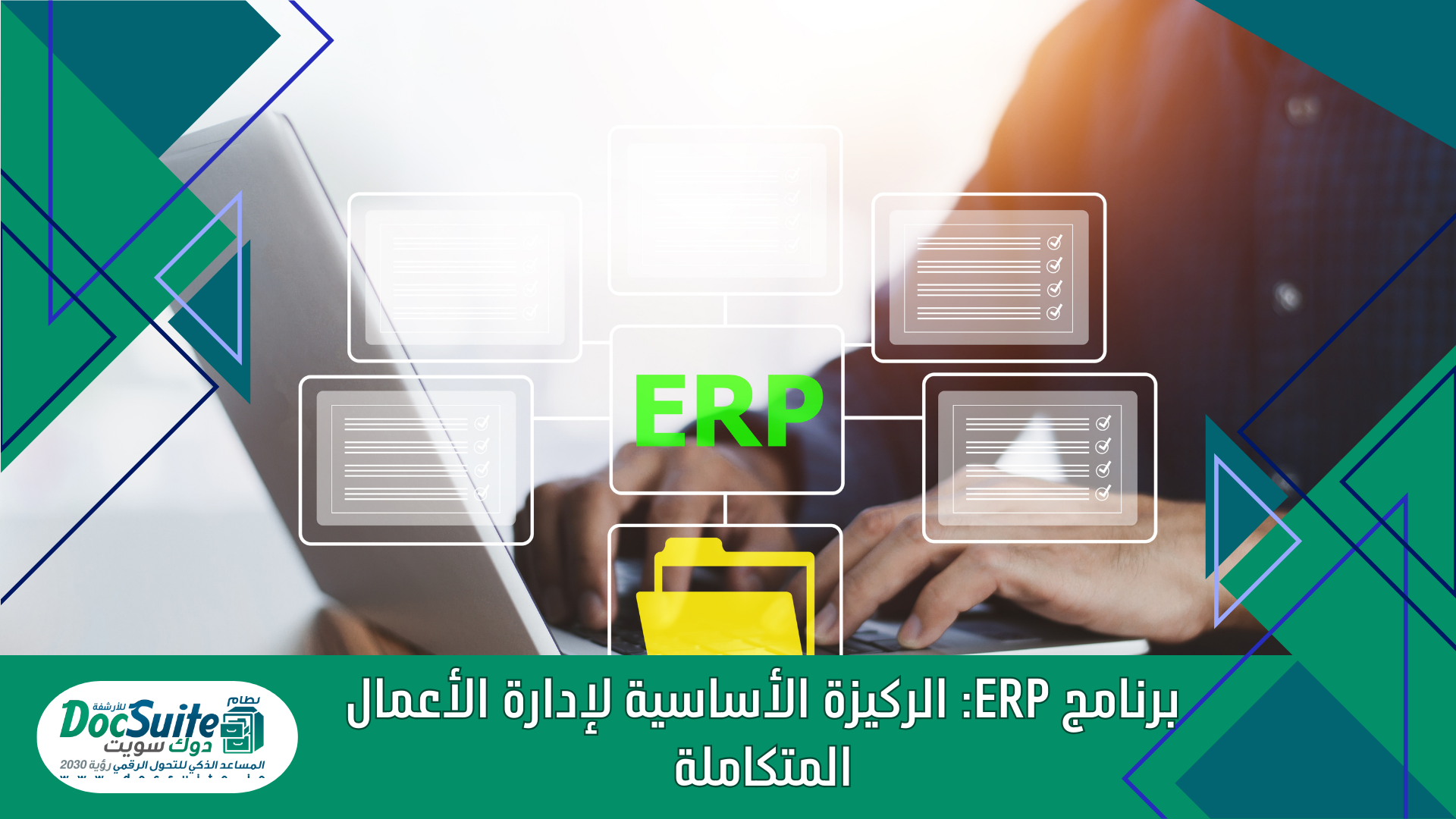فهرس الموضوع
ERP Software: The Foundation for Integrated Business Management
In the era of digital transformation, electronic systems, especially ERP software, have become an essential part of managing modern institutions. Many companies seek to integrate various aspects of administrative and financial operations to improve efficiency and productivity. Among the leading systems that contribute to this transformation is the Doc Suite system (DocSuite), which combines intelligent document management and administrative process automation.
The role of DocSuite is to facilitate daily operations and provide a secure electronic environment that ensures efficient organization and storage of documents, which makes it an integrated solution that contributes to supporting larger administrative systems such as enterprise resource planning systems (ERP), while the ERP software system focuses on the integration of financial, logistics and human resource management, DocSuite provides the capabilities of managing documents and administrative communications seamlessly, which enhances the effectiveness and flexibility of using ERP software systems in organizations.
In these lines, we will learn together about the ERP program closely, and the role of the DocSuite system in facilitating dealing with it.
MWhat is ERP software?
In light of the rapid developments witnessed by the world today, companies and institutions need advanced solutions that support their operations and help them achieve excellence in competitive markets. Here comes the role of the Enterprise Resource Planning (ERP) system as one of the most important tools that allow companies to manage their resources in an integrated and organized manner, as it combines all departments of the company in one central system, by integrating basic operations such as finance, human resources, production, and purchasing. The ERP program contributes to reducing costs, improving efficiency, and increasing data transparency.
One of the most important benefits of ERP software is its system integration and the ability to exchange data quickly and easily between different departments. The system is designed to suit the needs of companies of all sizes, providing the ability to track all operations from start to finish without having to deal with separate systems. This comprehensive integration allows companies to monitor performance directly and manage resources with high efficiency.
Benefits of ERP in Improving Operational Efficiency
ERP offers businesses multiple benefits, including improved operational efficiency by unifying the system and improving the flow of information between departments. For example, an ERP software system can provide a company with a complete view of production and inventory processes, which helps improve production planning and reduce waste. Instead of relying on traditional management tools that can lead to duplication of effort, ERP software provides a comprehensive framework for optimizing all activities within a company.
When it comes to the flow of information, ERP software helps remove barriers between different departments. Instead of each department working separately, everyone works within a unified system where all data is up-to-date and available to everyone in real time. This improves coordination between departments and helps make informed decisions based on accurate data. For example, the sales department can access production and inventory data, which helps forecast sales and manage orders more effectively.
In this context, DocSuite comes as a complementary tool that contributes to automating the management of documents and records within companies, which contributes to simplifying the storage and access processes of information, and thus improving the integration between the various administrative processes. While the ERP program focuses on managing resources, financial and logistical flows, DocSuite adds another dimension that ensures that all necessary administrative information and documents are available and organized in a way that contributes to supporting operations in a comprehensive manner.
Integration between ERP and document management
It is well known that many administrative tasks depend heavily on documents and papers. Companies that still rely on traditional methods of document management may experience slowdowns in operations due to dispersion and disorganization. Therefore, DocSuite is an innovative solution to support these companies by providing an intelligent document management system that improves workflow and saves time.
When DocSuite is integrated with an ERP software system, companies can achieve a higher level of automation and flexibility in operations. For example, documents related to orders and contracts can be linked directly to the ERP software system, making it easier for employees to access this information in real time and make decisions faster and more accurately. This type of integration enhances collaboration between departments, making operations more streamlined and efficient.
By integrating systems like ERP and DocSuite, there are tangible benefits to productivity. ERP helps organize resources and plan operations effectively, while DocSuite provides intelligent document and transaction management, allowing information to be stored in a secure and organized manner. This ability to link administrative processes to actual resources means that companies can improve overall performance while reducing wasted time and effort.
Achieving full integration between financial and administrative operations
ERP deals with financial and logistical operations in a comprehensive manner, providing accurate monitoring of both revenues and expenses by integrating accounting and inventory management systems. This system accurately analyzes financial data and helps companies improve their financial strategies. Companies can also track project costs and set financial goals proactively based on the available data.
In this aspect, DocSuite can support ERP by providing professional document management that enables contracts, invoices and financial reports to be kept in an organized and secure manner. By automating these documents and managing them in an integrated manner with ERP, the system can provide accurate and up-to-date information that allows companies to improve decision-making processes and increase efficiency in managing funds.
Through this integration, companies can ensure that all information related to financial resources and administrative transactions is always available and accessible to all relevant parties, which contributes to enhancing transparency and supporting strategic planning processes. This ability to integrate systems increases the company’s flexibility, enabling it to respond faster to market changes and business needs.
The Digital Future of Business and ERP
In the age of digital transformation, integration between business management systems is one of the most important factors that help companies adapt to future challenges. An ERP software system provides a basic framework that connects all the vital processes in a company, but adding complementary systems such as DocSuite enhances this integration even further. DocSuite helps manage vital documents in an intelligent way, reducing manual procedures and increasing efficiency.
By integrating ERP and DocSuite, companies can better manage their data and resources, helping them achieve their goals and increase their competitiveness. These integrated systems can provide a solid foundation for digital transformation, where all processes, whether administrative or operational, are integrated into one integrated system that allows performance monitoring and continuous process improvement.
Ultimately, adopting ERP is not only a step towards improving administrative efficiency and internal operations, but it is also a starting point for achieving a comprehensive digital transformation. When integrated with a system like DocSuite, companies have the ability to manage their operations and documents more effectively and flexibly, helping them successfully face future challenges.

Relationship between DocSuite and ERP
DocSuite is known as (DocSuite) is an advanced solution that focuses on smart document management and automation of administrative processes within institutions. Its role is to transform traditional paperwork into an integrated electronic system, which facilitates the processes of saving, organizing, and quickly retrieving documents and papers. The system also supports the flow of work between different departments in a smooth and efficient manner, which reduces human errors and speeds up the implementation of administrative tasks.
DocSuite's role is closely linked to the ERP system (ERP), ERP is a comprehensive system for managing various aspects of business such as finance, human resources, purchasing, and production. ERP software provides integration between these departments to ensure that operations run efficiently and under a unified framework. Here comes the role of DocSuite in completing this integration by enhancing the effective management of documents related to the operations managed by ERP.
By integrating DocSuite with an ERP software system, companies can manage administrative and financial processes more integratedly. For example, an ERP software system can handle invoices or supplier contracts, while DocSuite manages documents related to these processes, such as electronic invoices, supply contracts, and correspondence between departments. This integration allows for quick access to information through a single system, which enhances the accuracy of processes, reduces duplication, and ensures the smooth flow of information across all company departments.
The main benefits of the integration between DocSuite andERP in:
improve information flow: Allows documents and data related to financial and logistical operations to be easily linked across different departments.
Reduce repetition and errors: Reduces the need for manual data entry and reduces the chances of errors or duplication of data.
Speed up decision making: Provides quick access to relevant documents and information, helping managers make decisions based on accurate and timely data.
Improve securityBy using advanced security technologies, DocSuite ensures the protection of sensitive information and legal documents, enhancing the security of financial and administrative operations within the ERP software.
In short, DocSuite complements the functionality of ERP software systems and enhances their efficiency by improving document management, supporting automation, and reducing the complexity of administrative processes
